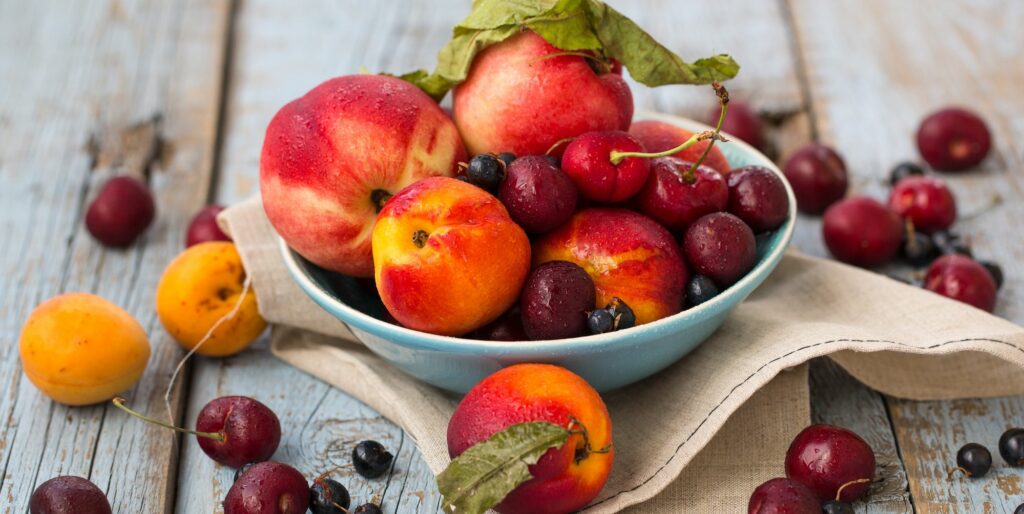Stone fruits, also known as drupes, are characterized by their hard seed encased within a juicy outer flesh. They are celebrated not only for their sweet, tangy flavors but also for their health benefits. Here’s an exploration of six popular stone fruits: peaches, cherries, plums, apricots, nectarines, and mangoes.
Peaches
Nutritional Profile
Peaches are rich in vitamins A and C, antioxidants, and fiber. They support immune health, skin health, and digestion.
Culinary Uses
Peaches are versatile in the kitchen. They can be eaten fresh, baked into pies, grilled, or added to salads and smoothies.
Health Benefits
The antioxidants in peaches can help fight oxidative stress, while their fiber content promotes digestive health.
Cherries
Nutritional Profile
Cherries are packed with antioxidants, vitamin C, potassium, and fiber. They are particularly noted for their high anthocyanin content.
Culinary Uses
Enjoy cherries fresh, or use them in baking, sauces, and cocktails. Dried cherries make a great addition to trail mixes and salads.
Health Benefits
Cherries have anti-inflammatory properties and may aid in muscle recovery, sleep quality, and reducing arthritis and cardiovascular risk.
Plums
Nutritional Profile
Plums are a good source of vitamins A, C, and K, potassium, and fiber. They also contain anthocyanins, which have antioxidant effects.
Culinary Uses
Plums can be eaten fresh or used in jams, jellies, and desserts. They can also be dried to make prunes, which have digestive benefits.
Health Benefits
Consuming plums can help in the absorption of iron, improve heart health, and regulate digestive health.
Apricots
Nutritional Profile
Apricots are rich in vitamins A and C, fiber, and potassium. They also offer a good dose of antioxidants.
Culinary Uses
Apricots are delicious fresh or dried. They can be used in baking, added to cereals, or cooked down into jams and sauces.
Health Benefits
Apricots can promote eye health due to their high vitamin A content and aid in digestion thanks to their fiber.
Nectarines
Nutritional Profile
Nectarines provide vitamins A and C, potassium, and are a good source of antioxidants and fiber.
Culinary Uses
Nectarines can be used interchangeably with peaches in recipes. They’re great in salads, pies, and smoothies, or simply eaten fresh.
Health Benefits
Nectarines can support skin health, immune function, and heart health. Their fiber content also promotes good digestive health.
Mangoes
Nutritional Profile
Mangoes are high in vitamins A and C, contain over 20 different vitamins and minerals, and are rich in antioxidants.
Culinary Uses
Mangoes are versatile fruits that can be used in sweet and savory dishes. Enjoy them fresh, in smoothies, salads, salsas, and even in rice dishes or curries.
Health Benefits
Mangoes can support immune health, promote healthy gut bacteria, improve heart health, and help in maintaining good vision.
FAQs
What makes stone fruits healthy?
Stone fruits are packed with vitamins, minerals, and antioxidants. Their rich nutritional content supports overall health, including heart health, digestive health, and immune function.
Can I eat stone fruits every day?
Yes, incorporating stone fruits into your daily diet can contribute to a healthy and balanced diet, offering a variety of nutrients and health benefits.
Are stone fruits high in sugar?
While stone fruits contain natural sugars, they are also rich in fiber and have a low energy density, making them a nutritious choice that can fit into a balanced diet.
How should I store stone fruits?
Most stone fruits ripen best at room temperature. Once ripe, they can be stored in the refrigerator to prolong freshness. Ensure they’re ripe before refrigerating to maximize flavor and nutritional value.
Can stone fruits be frozen?
Yes, stone fruits can be frozen. Pit and slice them, then lay them on a baking sheet to freeze individually before transferring to a freezer-safe bag. This method prevents them from sticking together and makes it easy to use the amount you need.
Are there any risks associated with eating stone fruits?
For most people, stone fruits are a healthy choice. However, individuals with specific fruit allergies should consult a healthcare provider. Also, the pits of stone fruits should not be consumed as they can be toxic in large quantities.
How can I incorporate more stone fruits into my diet?
Add stone fruits to your breakfast cereal, oatmeal, or yogurt. Use them in smoothies, salads, or as a natural sweetener in baking. Experiment with savory dishes that incorporate stone fruits, such as salsas or chutneys, to add a sweet and tangy flavor.
In conclusion
stone fruits are not only delicious and versatile in the kitchen but also offer a plethora of health benefits. From supporting heart health to improving digestion and boosting the immune system, these fruits are a fantastic addition to a balanced diet. By including a variety of stone fruits in your meals and snacks, you can enjoy their delightful flavors while taking advantage of their nutritional benefits.
- Light Eyes Ultra – Dark Circles Treatment Near Surbiton, Surrey - June 1, 2025
- Weed Beverages That Don’t Taste Like Weed - May 31, 2025
- Profhilo Treatment Near Dunsfold, Surrey - May 31, 2025

